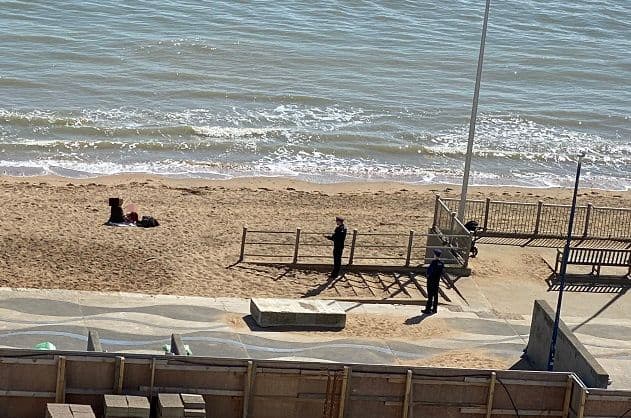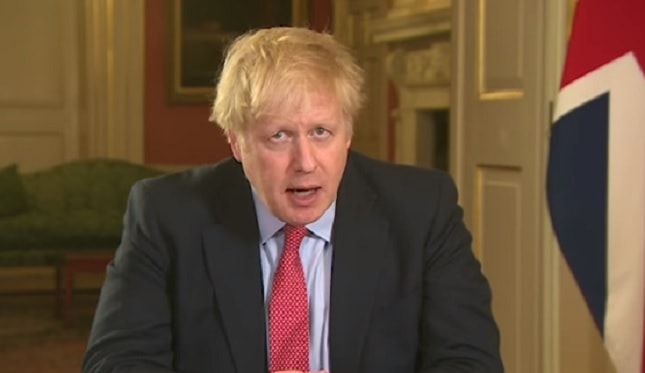
Police have dispersed a gathering in Margate and sent away a woman and child who had been sitting on the beach in Ramsgate today (April 7) during routine patrols across the isle.
Officers are enforcing government social distancing instructions in a bid the slow the spread of coronavirus.
Six fines have been issued to people in Kent through new legislation introduced under the Coronavirus Act. This gives police the ability to fine or arrest people who fail to comply with the Government’s directions to stay at home, an enforcement tactic which will only be used as a last resort in Kent.
None of the fines have been issued in Thanet.

Assistant Chief Constable Claire Nix said: “As part of their routine patrolling across the county, Kent Police officers are engaging with individuals and businesses to ensure they are adhering to the Government’s instructions around social distancing.
“Officers are engaging with those going against the instructions, explaining why they are necessary and encouraging them to comply, with enforcement being used only as a last resort. As of Monday 6 April 2020 a total of six fines have been issued.
“I would like to thank the vast majority of people in Kent for continuing to play their part at this difficult time by staying at home, protecting the NHS and saving lives.”
Thank you for staying safe Broadstairs #StayHomeSaveLives pic.twitter.com/DHsUOq9fHr
— Kent Police Thanet (@KentPoliceThan) April 5, 2020
During last weekend police patrols in Thane reported most people were complying with the instruction to stay at home and the majority of the beaches were empty. One group was dispersed from the Margate steps.
However there has been some frustration over reports being made of constant gatherings that are not dispersed.
Athelstan Road Tenants and Residents Association says nine reports have been made over a lack of social distancing on the Cliftonville road.
In a letter to police and councillors ARTRA states: “The public health time bomb resulting from the ongoing daily behaviour on Athelstan Road, cannot be overstated and it is disturbing that my previous attempts to communicate with the police and ward councillors has, with the exception of KCC Cllr Barry Lewis, so far been effectively ignored -absolutely no rudeness intended – en masse.

Current government instructions are to only leave your home for:
- shopping for basic necessities, for example food and medicine, which must be as infrequent as possible
- one form of exercise a day, for example a run, walk, or cycle – alone or with members of your household
- any medical need, including to donate blood, avoid or escape risk of injury or harm, or to provide care or to help a vulnerable person
- travelling for work purposes, but only where you cannot work from home
According to government figures as of 9am today ( April 7), 213,181 people have been tested, of whom 55,242 tested positive. Today’s figure for people tested does not include Manchester and Leeds due to a data processing delay. The tests concluded figure excludes data from Northern Ireland.
The number of people admitted to hospital with coronavirus symptoms now stands at 18,589.
As of 5pm on 6 April, of those hospitalised in the UK who tested positive for coronavirus, 6,159 have died.The figures only account for deaths in hospital.
In Kent and Medway 1,119 people have tested positive for the virus. There have been 37 deaths in East Kent Hospitals to date.

Those battling the virus include Prime Minister Boris Johnson who has been under the care of doctors at St Thomas’ Hospital, in London since Sunday, after being admitted with persistent symptoms of coronavirus.
The Prime Minister was moved to intensive care yesterday (April 6) after his condition worsened. He remained stable overnight and is receiving standard oxygen treatment and breathing without any assistance. He has not required mechanical ventilation or non-invasive respiratory support.
The PM has asked Foreign Secretary Dominic Raab, who is the First Secretary of State, to deputise for him where necessary.
Primary care ‘hot site’ at Whitstable
Changes in the way GP surgeries are run are now being rolled out across Kent and Medway to ensure the safety of staff and patients during the Covid-19 outbreak.
Each primary care network – which are groups of GP surgeries in the same area working together – will be splitting patient care across different sites, meaning the normal primary care needs of patients who have Covid-19 symptoms can be met in a primary care treatment centre, while other premises will aim to remain virus free.
Patients will be referred to a primary care treatment centre, known as a ‘hot site’, by their GP or via NHS 111; they are not testing centres or a walk-in service.
Although as many patients as possible will be assessed via video and telephone appointments, which will avoid unnecessary risk and travel, there will be occasions when people need to see a clinician face-to-face and the aim of these centres if to assess this cohort of patients.
A hot site with drive through facilities is currently being constructed at Estuary View medical centre in Whistable is hoped to be operational by the end of this week.
The aim is to assess and treat patients who have Covid-19 symptoms, such as a persistent cough or a temperature over 37.8 degrees, in a safe setting and ensure patients without symptoms can be seen at the other sites with a minimal risk of infection.
CCG teams are now working with primary care networks to ensure the proposed hot sites meet NHS guidelines, can deliver safe services and that appropriate infection prevention and control measures are in place for patients and staff. Methods of prescribing are also being explored to minimise potentially infectious patients having to visit pharmacies.

